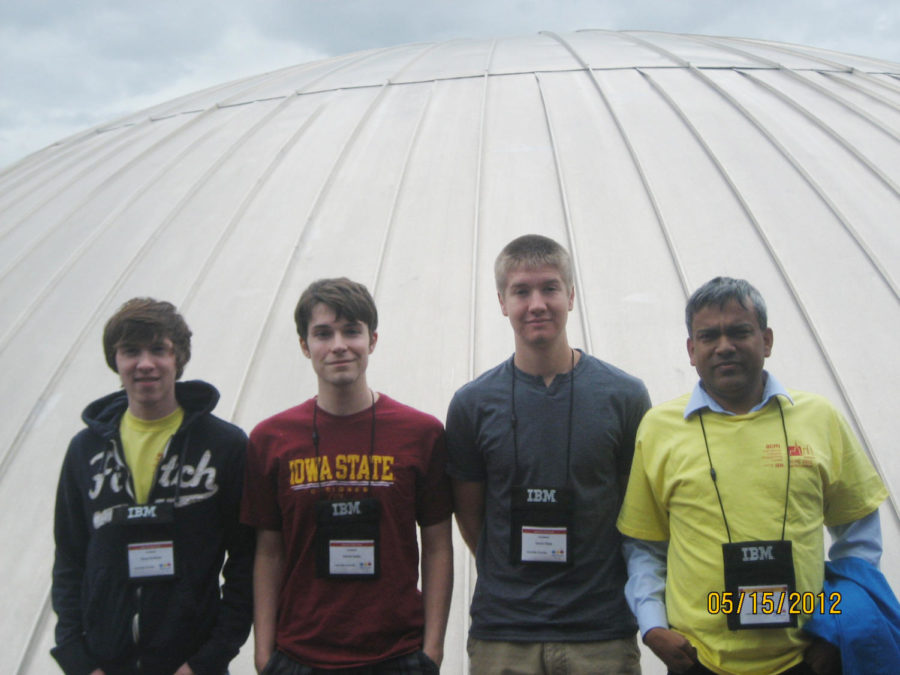Three students to compete in programming world finals in Poland
Photo courtesy of Simanta Mitra
Bryce Sandlund, left, senior in computer science; Kerrick Staley, senior in computer engineering; Devon Eilers, junior in management information systems; and Simanta Mitra, senior lecturer in computer science, are competing at the Association for Computing Machinery international collegiate programming contest from May 14 to 18 at the University of Warsaw in Poland.
May 14, 2012
Three Iowa State students are headed to Poland to compete at the Association for Computing Machinery international collegiate programming contest from May 14 to 18 at the University of Warsaw.
Devon Eilers, junior in management information systems; Kerrick Staley, senior in compuer engineering; and Bryce Sandlund, senior in computer science, will be competing with 333 other individuals from schools such as MIT, Standford and Carnegie Mellon as well as other top universities around the world.
After winning second place at the regional competition, the team was qualified to the world finals in Poland. Originally the team had been awarded seventh place due to a disqualification in the last few minutes of the regional competition.
Sandlund said one of their programs had been written in a way that, during the competition, judges had decided used techniques that were not allowed. They had disqualified the solution with a new rule created in the last remaining seconds, which Sandlund said he felt was not fair at all.
This is where Simanta Mitra, the team’s faculty adviser and coach, stepped in. Seeing the team had solved the problem before the new rule had been set and the solution had been accepted, Mitra submitted a formal appeal with association. The appeal was successful, moving the ISU team to second place and giving them a position to compete in the World Finals.
Laurel Tweed, program coordinator for the department of computer science, said that Iowa State’s teams usually do very well.
“If we don’t send someone to the finals, they’ve usually placed pretty high,” Tweed said. “Probably because of all Dr. Mitra’s preparation efforts.”
Tweed said Mitra has been advising teams for years, and does a lot of work with students to get them ready. This includes such practices as organizing practice runs or bringing them to practice competitions, which usually occur every other weekend before the competition.
Sandlund said Mitra offered a lot of advice and material for the team to look at, but that Sandlund felt mostly responsible for his own advancement. He said he has been trying to expand his knowledge base with different programming techniques and has been looking over previous world finals problem sets and solutions.
Tweed said this year’s team differs from those of the past because they all come from different majors. In past years, student competitors have usually been computer science majors.
“Each team member brings something unique to the process,” Tweed said. “Staley is good at time management, Eilers recognizes underlying difficulty in a seemingly simple problem and Sandlund is good at balancing thinking and doing — a critical skill for recognizing when to stop planning and start coding.”
Sandlund said the team works very well together.
“Our personalities are very similar,” Sandlund said. “It just kind of clicked.”
Problems at the programming competition are problem-solving questions that are answered with a programming algorithm that will compute the right answer in the right amount of time — approximately 45 seconds for the program to run over the data.
“The problems are pretty easy to understand,” Sandlund said. “Doing the programming behind it is harder to understand.”
Sandlund added that the problems at the world finals will be much more difficult than what the team has seen before.
“We’re all only second year students,” Sandlund said. “I haven’t even had a few of the computer science classes that really help with the competition. … Some of the problems are beyond me.”
Sandlund said he does not expect to win the world finals.
“We’re going to the competition [but] we’re not going to be one of the top 25 or 50, but we’re going to do the best that we can,” Sandlund said. “It’s cool enough to get this far.”

















